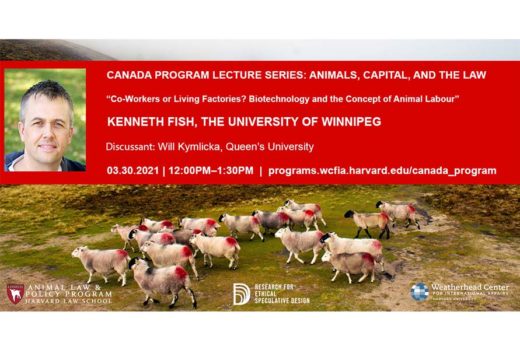This webinar, co-sponsored by Harvard's Animal Law & Policy Program, Research for Ethical Speculative Design and Harvard's Weatherhead Center for International Affairs, explores why the concept of animal labour has become popular in critical animal studies and its intention to grasp the role of non-humans in the production process in a way that avoids regarding them as passive objects of human manipulation.
Event Overview
Kenneth Fish (The Universith of Winnipeg)
Discussant: Will Kymlicka (Queen’s University)
In 2000 Nexia Biotechnologies of Montreal introduced its first BELE® goats, Peter and Webster. Genetically engineered with the DNA of an orb weaver spider, Peter and Webster would sire whole herds of spider-goats whose ‘silky milk’ could be processed into BioSteel® for use in everything from sporting equipment to bullet-proof vests. The goats became the new faces of a fledgling animal biotechnology industry whose potential to position transgenic animals as instruments of production seemed to confirm the greatest hopes and fears surrounding genetic engineering. Peter and Webster made headlines in Canada and abroad, and even found their way into Margaret Atwood’s dystopian science fiction novel Oryx and Crake. But perhaps these spider-goats and their transgenic kin, rather than instruments of production, might better be viewed as workers? The concept of animal labour has become popular in critical animal studies and is intended to grasp the role of non-humans in the production process in a way that avoids regarding them as passive objects of human manipulation. The example of transgenic animals highlights the analytical and political limitations of the concept of animal labour and presents an alternative rooted in Marx’s theorization of the labour process. I will argue that conceptualizing animals as ‘living factories’ better captures their role in the production process and raises a more fruitful set of questions concerning their alienation and the kinds of social transformations that might assist in their liberation.
Please register here: https://harvard.zoom.us/webinar/register/WN_4ak24DVbTQShTvugy4Y0qA
Animals, Capital, and the Law
The purpose of this Webinar series is to highlight new and creative research in the growing field of animal studies. This series will emphasize how Canadian scholars, jurists, and writers have played a disproportionately influential role in the development of this interdisciplinary subject. Ranging from Sue Donaldson’s and Will Kymlicka’s Zoopolis and Nicole Shukin’s Animal Capital through to Margaret Atwood’s Oryx and Crake, Canadians have broadened how we should think about our fraught relationship to other species. Moreover, the Canadian legal system has had to rule on contentious cases related to animal ethics, such as R. v. Krajnc (2017), and will soon have to evaluate Ontario’s new ‘ag-gag’ laws. This series, sponsored by the Canada Program at the Weatherhead Center for International Affairs and Harvard’s Animal Law & Policy Program, will host a monthly online lecture during the spring term. Each 40-minute talk will be followed by a ten minute critique by an invited discussant, to be followed by a Q+A with the audience.
All webinars will be held during the last Tuesday of each month and run from 12-1:30 p.m. Registration is required for each event.

